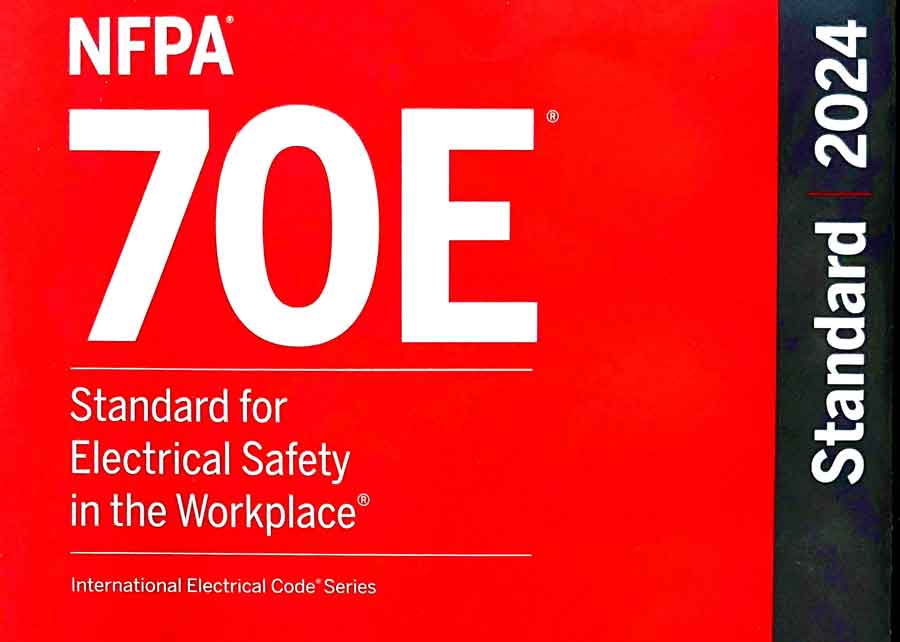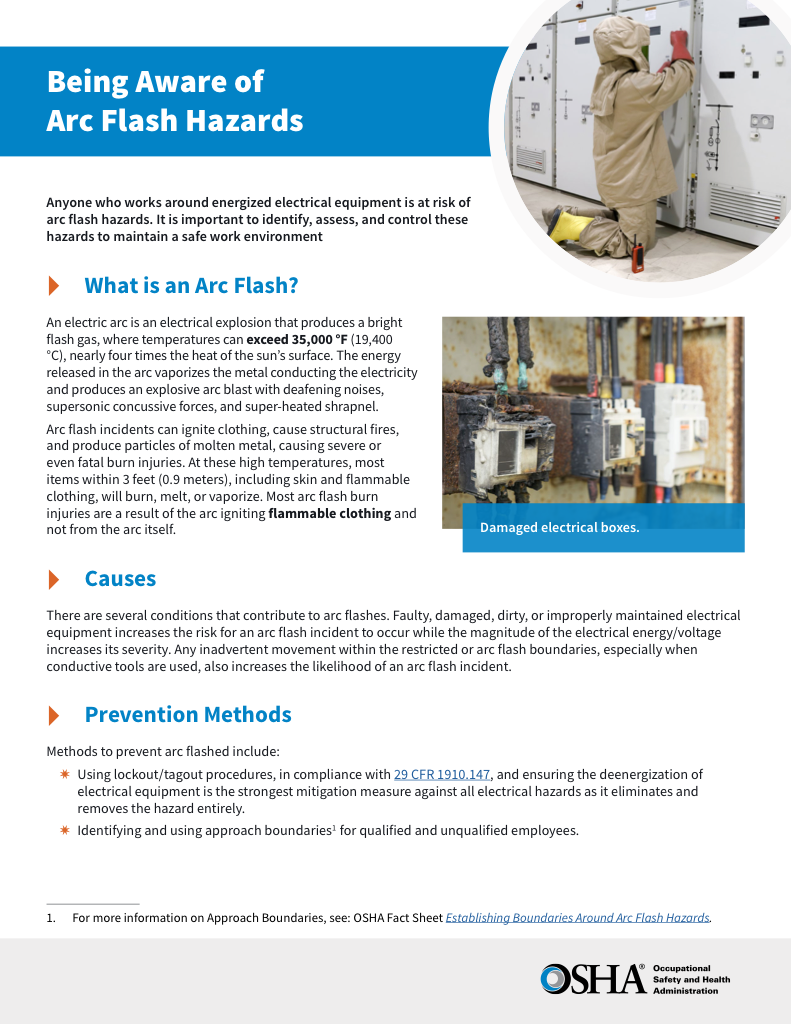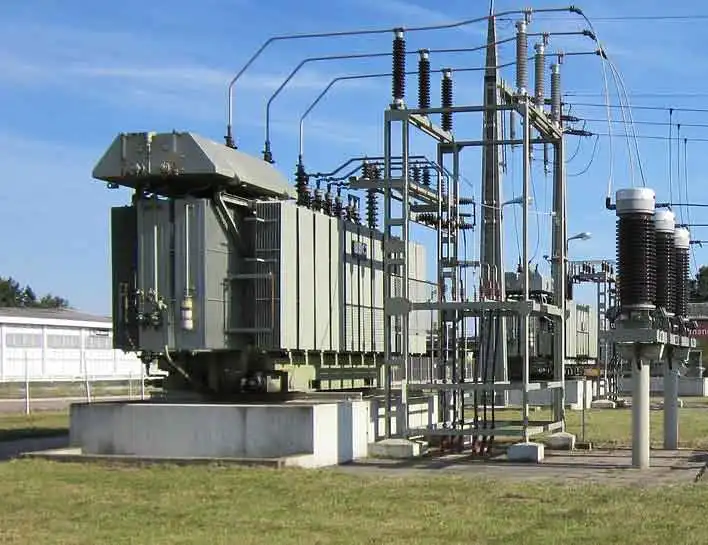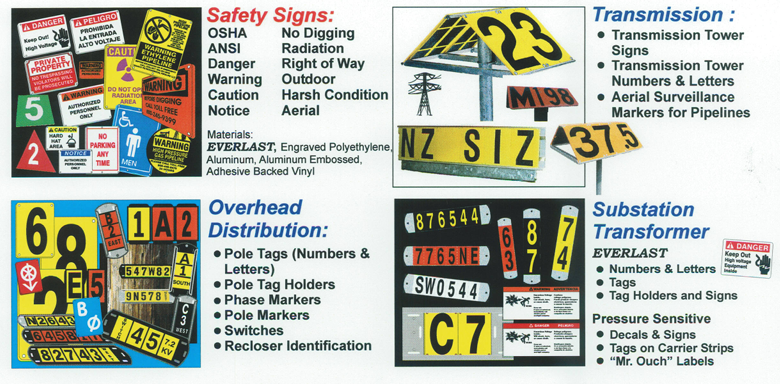NFPA 70E Was Originally Developed at OSHA's Request to Address Electrical Hazards
By R.W. Hurst, Editor

NFPA 70e Training
Our customized live online or in‑person group training can be delivered to your staff at your location.

- Live Online
- 6 hours Instructor-led
- Group Training Available
Download Our OSHA 4475 Fact Sheet – Being Aware of Arc Flash Hazards

- Identify root causes of arc flash incidents and contributing conditions
- Apply prevention strategies including LOTO, PPE, and testing protocols
- Understand OSHA requirements for training and equipment maintenance
NFPA 70E was originally developed at OSHA’s request to address electrical safety in the workplace, specifically arc flash and shock hazards. It outlines standards for safe work practices, PPE, and risk assessments to reduce injuries in industrial and commercial electrical environments.
Is it true that the NFPA 70E was originally developed at OSHA's request?
NFPA 70E was created to support OSHA regulations by defining practical safety measures:
✅ Addresses arc flash and shock hazards in electrical work
✅ Provides detailed PPE and safe work practice requirements
✅ Helps employers comply with OSHA workplace safety mandates
NFPA 70E was originally developed at OSHA's request to improve electrical safety in the workplace. Let's explore the specific workplace hazards that prompted OSHA to request the development of NFPA 70E, the influence of OSHA's request on the standard, key electrical safety concerns addressed, the evolution of the standard, and its role in complementing OSHA regulations.
Request a Free Training Quotation
What Specific Workplace Hazards Did OSHA Seek to Address Through the Development of NFPA 70E?
OSHA identified several critical workplace hazards related to electrical work that needed immediate attention. These hazards included arc flashes, electric shocks, and explosions resulting from improper handling of electrical equipment. OSHA aimed to mitigate these risks by establishing comprehensive guidelines for safe work practices. The request for NFPA 70E was driven by the need to create a framework that would ensure workers' safety when dealing with electrical hazards, thus reducing the frequency and severity of electrical accidents. For guidance on meeting OSHA's electrical safety standards, including training and PPE requirements, consult OSHA Electrical Safety: Safe Work Practices
How Did OSHA's Request Influence the Scope and Focus of the NFPA 70E Standard?
OSHA's request significantly influenced the scope and focus of NFPA 70E. The standard was designed to address not only the immediate dangers of electrical work but also the underlying factors contributing to unsafe work conditions. This included establishing clear protocols for hazard assessment, safe work practices, personal protective equipment (PPE) requirements, and training for electrical workers. By focusing on a broad range of safety measures, NFPA 70E provided a comprehensive approach to electrical safety that aligned with OSHA's goal of protecting workers from electrical hazards. To delve deeper into how OSHA's regulations align with NFPA 70E guidelines, explore our article on What Is the Relationship Between OSHA and NFPA 70E?
Test Your Knowledge About Arc Flash!
Think you know Arc Flash? Take our quick, interactive quiz and test your knowledge in minutes.
- Instantly see your results and score
- Identify strengths and areas for improvement
- Challenge yourself on real-world electrical topics
What Were the Key Electrical Safety Concerns That Prompted OSHA to Seek the Development of NFPA 70E?
The key electrical safety concerns prompting OSHA's request for NFPA 70E development included the high incidence of electrical injuries and fatalities, the lack of standardized safe work practices, and the inadequate use of PPE among electrical workers. OSHA recognized that addressing these concerns required a detailed standard that would provide clear and actionable guidelines for employers and employees. The resulting NFPA 70E standard focused on reducing electrical hazards by promoting safe work practices and improving overall work conditions.
How Has NFPA 70E Evolved Since Its Initial Development in Response to OSHA's Request?
Since its initial development, NFPA 70E has evolved to address emerging electrical safety challenges and incorporate advancements in technology and safety practices. Regular updates to the standard have expanded its scope to include new safety protocols, updated PPE requirements, and enhanced training programs. These revisions ensure that NFPA 70E remains relevant and effective in protecting workers from electrical hazards in an ever-changing work environment. The ongoing collaboration between NFPA and OSHA has been crucial in maintaining the standard's alignment with federal safety regulations and industry best practices. To understand how to establish safe working distances and protect personnel, refer to Arc Flash Boundary definition: OSHA, NFPA 70E and IEEE.
What Role Does NFPA 70E Play in Complementing OSHA Regulations for Electrical Safety in the Workplace?
NFPA 70E plays a crucial role in complementing OSHA regulations by providing detailed guidelines and best practices for electrical safety that exceed the basic requirements of OSHA standards. While OSHA regulations establish the legal framework for workplace safety, NFPA 70E offers practical solutions and procedures that help employers and employees achieve a higher level of safety in electrical work. This includes specific recommendations for safe work practices, hazard assessments, and the use of PPE. By integrating NFPA 70E into their safety programs, organizations can enhance their compliance with OSHA regulations and ensure a safer work environment for their employees.
NFPA 70E, originally developed at OSHA's request, addresses a wide range of electrical hazards and has evolved to meet the industry's changing needs. Its comprehensive approach to electrical safety complements OSHA regulations and helps create safer work conditions for electrical workers.
Related Articles:








